Explosion at port compared to atomic bomb going off, apparently caused by fireworks and chemicals catching fire; no Israeli involvement suspected
By Aaron Boxerman, TOI
A general view of the scene of an explosion at the port of Lebanon’s capital Beirut, on August 4, 2020 . (STR / AFP)
A huge explosion rocked the Lebanese capital Beirut on Tuesday, killing at least 27 people and injuring over 2,500, according to the country’s health minister.
The blast shook buildings, shattered windows, sent a huge plume of smoke into the sky and left a wide swath of destruction across the city. There were thousands of casualties, with bodies buried under the rubble, officials said.
Lebanon’s health ministry said 27 people had been confirmed dead and over 2,500 were injured. Hours after the explosion, ambulances were still carrying away the wounded and officials said Beirut’s hospitals were full. Army helicopters helped battle fires raging at the port.
Doctors were operating on patients in parking lots as hospitals overflow. Some hospitals have also lost electricity due to Lebanon’s long-running infrastructure problems.
“We’re doing surgery in the hallways,” a Beirut hospital director told al-Mayadeen.
Lebanese officials said the blast was caused by a fireworks storehouse at the city’s port catching fire, but some later said that the explosion was caused by chemicals being stored at the dock. Though some suspicions around the blast turned to Israel, which has been involved in a standoff with Lebanese terror group Hezbollah, both sides denied any link.
The official National News Agency confirmed deaths in the blast, without citing a number.
Video taken by residents showed a fire raging at the port, sending up a giant column of smoke, illuminated by flashes of what appear to be fireworks.
The fire then appeared to catch at a nearby building, triggering a more massive explosion, sending up a mushroom cloud and a shock wave over the city.
“It was like a nuclear explosion,” said Walid Abdo, a 43-year-old school teacher in the neighborhood of Gemayzeh near Beirut.
Charbel Haj, who works at the port, said it started as small explosions like firecrackers, then the huge blast erupted and he was thrown off his feet. His clothes were torn.
Miles from the port, balconies were knocked down, windows shattered, streets were covered with glass and bricks and lined with wrecked cars. Motorcyclists picked their way through traffic, carrying the injured.
Lebanese media carried images of people trapped under rubble, some bloodied, after the massive explosion.
“What we saw looked like Hiroshima or Nagasaki. It’s absolutely unprecedented in Lebanon’s history,” said Beirut Governor Marwan Aboud, before bursting into tears.
A soldier at the port, who asked not to be named, told AFP: “It’s a catastrophe inside. There are corpses on the ground. Ambulances are still lifting the dead.”
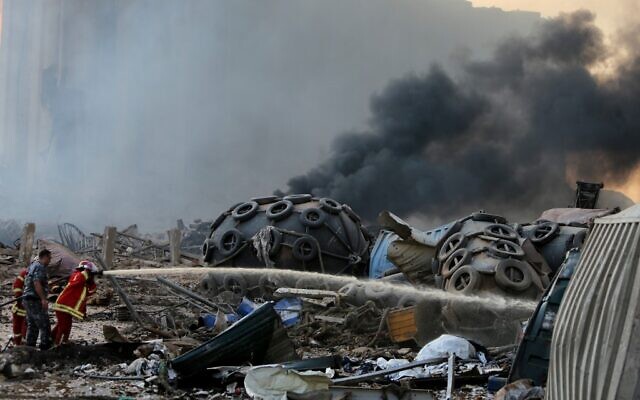
The scene of the explosion at the port in Beirut, on August 4, 2020. (STR / AFP)
An AFP correspondent at the scene said every shop in the Hamra commercial district had sustained damage, with entire shopfronts destroyed, windows shattered and many cars wrecked.
Injured people were walking in the street, while outside the Clemenceau Medical Center, dozens of wounded people, many covered in blood, were rushing to be admitted, including children.
A wounded man is checked by a fireman near the scene of the explosion in Beirut, on August 4, 2020. (Anwar AMRO/AFP)
“It felt like an earthquake … I felt it was bigger than the explosion in the assassination of [former prime minister] Rafik Hariri in 2005,” said a woman in the city center.
Online footage from the Daily Star Lebanon newspaper office showed blown out windows, scattered furniture and demolished interior paneling.
The port zone was cordoned off by the security forces, allowing access only to a string of ambulances, fire trucks and people whose relatives were working inside the devastated area, while others were screaming to be let through.
A huge blaze was burning at the port, where ambulances were rushing away the wounded, their sirens wailing.
The blasts were heard as far away as Nicosia on the eastern Mediterranean island of Cyprus, 240 kilometers (150 miles) away.
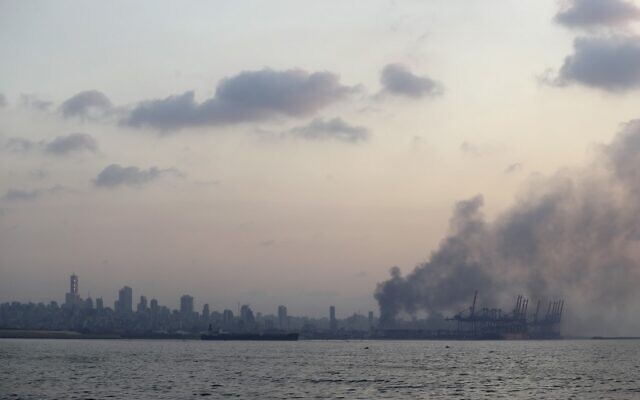
A picture taken from the coastal road on the northern outskirts of Beirut shows smoke billowing following an explosion in the Lebanese capital, on August 4, 2020.(JOSEPH EID / AFP)
Lebanon’s Prime Minister Hasan Diab has declared Wednesday a day of mourning, and President Michel Aoun called for “urgent” defense council talks.
Benjamin Strick, who works with investigations website Bellingcat, said on Twitter that the explosions appeared to have been centered on a 130 meter (420 foot) grey warehouse alongside a dock inside the port zone.
Director-General of Lebanon Public Security Abbas Ibrahim said that the storage area “contained highly explosive materials confiscated years ago.”
“To discuss fireworks is laughable,” he said. “I can’t predict what the investigation will reveal about the reasons for the explosion.”
Reports indicated that the material could have been sodium nitrate, a compound used both for making bombs and in fertilizer.
An Israeli official, speaking on condition of anonymity, denied that the Jewish state was involved in the explosions.
Figures close to Hezbollah were quoted telling Lebanese media that Israel was not involved.
The incident came as tensions have been high on the Israeli-Lebanese border, after Israel said it thwarted an infiltration attempt by up to five Hezbollah gunmen — a claim denied by the Iran-backed terror group.
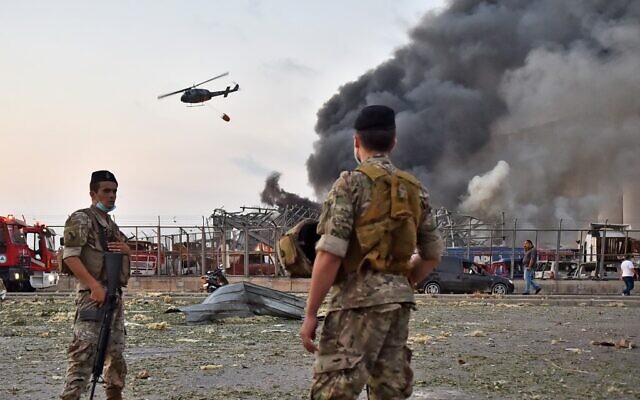
Lebanese army soldiers stand while behind a helicopter puts out a fire at the scene of an explosion at the port of Lebanon’s capital Beirut, on August 4, 2020. (STR / AFP)
Israeli Prime Minister Benjamin Netanyahu has accused Hezbollah of hiding arms among Beirut’s civilian population, a claim denied by the organization. Earlier Tuesday he warned Hezbollah against “testing” Israel.
Lebanon is already suffering its worst economic crisis in decades, which has left nearly half of the population in poverty.
Lebanon’s economy has collapsed in recent months, with the local currency plummeting against the dollar, businesses closing en masse and poverty soaring at the same alarming rate as unemployment.
The explosions also come as Lebanon awaits the verdict on Friday in the trial of men accused of murdering Hariri, who was killed in a huge truck bomb attack in 2005.
Four alleged members of Hezbollah are on trial in absentia at the court in the Netherlands over the bombing, which killed 21 other people in addition to Hariri.

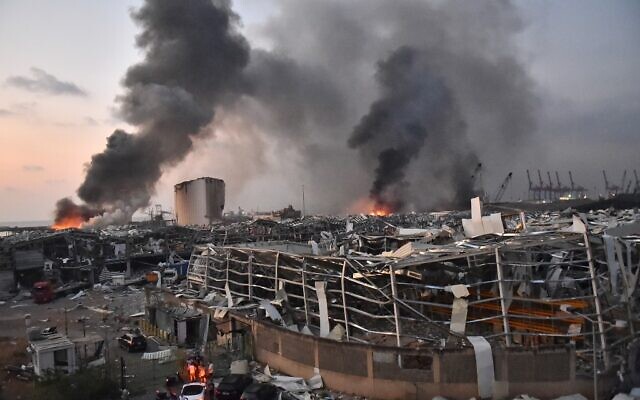
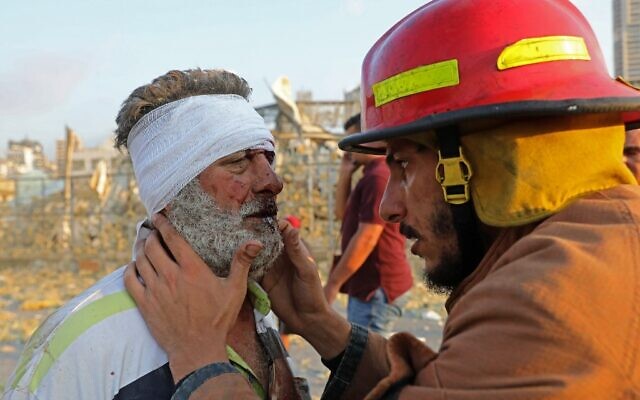


“The ammonium nitrate was likely produced by Rustavi Azot, Georgia’s top chemical manufacturer, but management said it could not confirm that with certainty as it has only operated the facility for the past three years. Azot said that ammonium nitrate expires six months after production, when its agricultural use dwindles. It called the long-term storage of the chemical in Beirut “a gross violation of safe storage measures.”
“A series of unfortunate events led up to the blast.
“The 2,750 tons of ammonium nitrate, carried by the Moldovan-flagged ship Rhosus, were not even meant for Lebanon. The freighter was on its way to Mozambique when it developed a technical problem and made an unscheduled call in Beirut. After inspection, the ship was deemed unfit for sailing and was later abandoned by its owner, Russian national Igor Grechushkin. The cargo was moved to a port warehouse, where it languished for almost seven years.
“Neglectful storage and government buck-passing precipitated the explosion. While commonly used as a fertilizer, ammonium nitrate can become unstable when exposed to heat, which is what seems to have happened when a fire broke out nearby on Tuesday.”
— https://eurasianet.org/georgias-awkward-connection-to-the-beirut-explosion
“Expires” — an interesting concept, in the chemical industry
@ Ted Belman:
https://www.youtube.com/watch?v=dxPQJlm6FtE
@ Ted Belman:
FLASHBACK: Netanyahu Warned the United Nations of Iranian Missile Stockpiles in Beirut Back in 2018 (VIDEO)
Every terrorist-including half-witted ones- has worked with ammonium nitrates. It seems a favoured choice of all desperados working to destroy someone else’s edifice.
Well, they knew it was there, and I would assume without doubt that it was being used by Hezbollah on a regular basis to increase or improve their vaunted arsenal. So there had to have been regular movement in and around the storage area. Arabs are incessant smokers, and reckless of consequences. Always looking forward to those worn out 72 virgins. We can be sure they were not using it to improve their crops.
So I suggest a careless discarded match not fully extinguished, or possibly a certain atmospheric dampness deep in it’s interior which, over a long period can generate heat, and finally internal combustion.
I have had much experience with materials of the latter kind, and for about 7 years, I would return around midnight -or later- and do a careful “sniffing” examination of all the stored material. Many times, I found, deep in the centre of a container, a small core of already glowing material ready to burst into flame.
On at least 3 occasions this factory burnt to the ground, We couldn’t ever get fire insurance.
@ Reader:
“The prime minister and presidency have said that 2,750 tonnes of ammonium nitrate, used in fertilisers and bombs, had been stored for six years at the port without safety measures.
“”It is negligence,” the official source told Reuters, adding that the issue on storing the material safely had come before several committees and judges and “nothing was done” to order the material be removed or disposed of.
“The source said a fire had started at port warehouse 9 on Tuesday and spread to warehouse 12, where the ammonium nitrate was stored. Another source close to a port employee said a team that inspected the material six months ago warned it could “blow up all of Beirut” if not removed….”
— https://www.thedailystar.net/world/news/beirut-blast-initial-probe-points-negligence-storage-ammonium-nitrate-1940193
@ Michael S:
The stuff was confiscated from a small ship six years ago and just sat there, basically, waiting to explode.
@ Ted Belman:
Hi, Ted
I’ve worked with NH4NO3. I believe the Lebanese PM, who implied that this was a massive “work accident”, most likely due to negligence. The stockpile of ammonium nitrate actually WAS a bomb, It just did not explode when its keepers wanted it to nor in the (controlled) way they probably hoped for.
It was most likely a “work accident”, the sort the IRA is all too familiar with.
YOU GUYS ARE ABSOLUTELY RIGHT.. iSRAEL HAD NOTHING TO DO WITH IT.
It’s a total disaster. The port is ruined, the whole city of Beirut is blasted, and the silos containing 85% of the country’s grain (imported) have been destroyed:
https://www.cbsnews.com/news/beirut-lebanon-explosion-assessed-day-after-port-incident-kills-dozens-injures-thousands-2020-08-05/
They will need help from the UN, I think.
Israel offered to help with the wounded (Ziv hospital).
Where are the noxious gasses if it was Amonia
@ Ted Belman:
Three US Defense Department officials told CNN that as of Tuesday night there was no indication that the massive explosions that rocked Beirut on Tuesday were an “attack,” contradicting an earlier claim from President Donald Trump.
One official said that if there were indications anyone in the region pulled something off of this scale, it would trigger automatic increases in force protection for US troops and assets in the region — if for no other reason than worry about retribution attacks.
That official noted that none of that has happened so far.
@ Ted Belman:
Did he mention WHO was the perpetrator in his opinion?
If it is a provocation of some kind, Israel needs it least of all.
President Donald Trump claimed a massive explosion that killed at least 78 people and wounded at least 4,000 in Beirut on Tuesday was “an attack,” contradicting the Lebanese government’s announcement that the blast involved the accidental detonation of a cache of explosive chemicals.
Yes, its hard to imagine Israel being so muderous.
Lebanese Prime Minister says #Beirut explosions caused by an estimated 2,750 tons of ammonium nitrate left unsecured for 6 years in a warehouse. He vows to punish officials responsible.
“Currently, it appears that the explosion in Lebanon was not the result of a military strike,” Jonathan Schanzer, senior vice president at the Foundation for Defense Democracies, told the network. “For now, this explosion appears to be the result of ineptitude.”
@ Edgar G.:
You did hit on a correct point Israel does NOT normally attack in daytime for many reasons, one safer for pilots, two less collateral damage, three harder to identify who is attacking. So this part of the reason I do not believe Israel had anything to do with this massive explosion.
There were lots of munitions what they were I do not know but unlikely it was just fireworks. There is much speculation in the various media including Lebanese.
@ Bear Klein:
I suppose this innocuous post will be “MODDERATED”…(maybe Moddddulated) or modderificated….like the other. I’ll eventually get fed up with it.
You can’t have “precision” when blowing up a factory, which has massive amounts of explosive material in many buildings.The question might be asked as to why was there such an amount of dangerous explosives. Do they manufacture for the whole galaxy. Any fireworks I’ve ever examined showed a very small strip of coated paper as the explosive which when pulled, resulted in a small cracking sound.
In these days, when so many fatal fireworks accidents have occurred in the past, it is suicide to have huge amounts of such material in any one place, or even use it to make a finished product to be sold over-the-counter.
Besides, if Israel was conducting “precision bombing”, they would not attack when there are thousands working . From the pictures it looks like a daytime affair..
Arutz7 Sheva headlines say “78 dead, 4,000 injured”….so far.
@ Ted Belman:
Your comment is not even close to being likely. Israeli strikes are precision so as NOT to cause collateral damage.
This is was not the work of Israel as it has already said unofficially.
Israel gets blamed for enough stuff that it does not do and and to use wild speculation just adds fuel on the fire. It is not responsible Ted!
So far 73 have been counted as dead in Beirut. Lebanon does not believe Israel had anything to do with this either.
@ Ted Belman:
Why blame Israel when even the Lebanese authorities don’t?
It’s a horrible tragedy, and President Rivlin has just offered help to Lebanon.
@ Ted Belman:
It’s a “work accident”, then.
Noah Pollak tweeted.
Beirut explosion is in area known to be used by Hezbollah for its long-range precision-guided missile project, which Israel publicly calls a red line. I have no specific knowledge, but would be surprised if explosives that detonated were not associated w/ that project. 1/